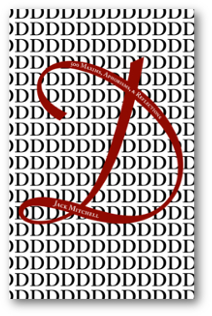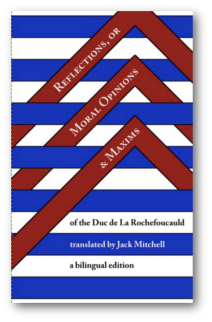The Aphoristic Tradition
Funny, smart, portable.
Aphorism is the single-malt Scotch of literature, packing the maximum punch into the smallest volume. Perfect for the bedside, the dinner table, or the armchair, aphorisms are easy to put down — and even easier to pick up.
Here at AUL Press, we are determined to be part of the revival of the aphoristic tradition by publishing aphorisms both old and new. Jack Mitchell's D, or 500 Maxims, Aphorisms, and Reflections offers a lively new perspective on the classic topics of pride, happiness, divinity, death, love, friendship, art, politics, while his translation of the Maxims of the Duc de La Rochefoucauld brings the great French master to life again in English.
In the future we intend to expand the series with translations of aphorists such as Vauvenargues, Goethe, and Karl Kraus, among others.
Here at AUL Press, we are determined to be part of the revival of the aphoristic tradition by publishing aphorisms both old and new. Jack Mitchell's D, or 500 Maxims, Aphorisms, and Reflections offers a lively new perspective on the classic topics of pride, happiness, divinity, death, love, friendship, art, politics, while his translation of the Maxims of the Duc de La Rochefoucauld brings the great French master to life again in English.
In the future we intend to expand the series with translations of aphorists such as Vauvenargues, Goethe, and Karl Kraus, among others.
D, or 500 Maxims, Aphorisms, and Reflections
by Jack Mitchell
Jack Mitchell's latest book is a collection of original aphorisms, 500 in number, in the spirit of the great French aphorist La Rochefoucauld (whom he has also translated: please see below).
D consists mainly of the 500 aphorisms, but also includes a brisk but bracing survey of the aphoristic tradition, covering La Rochefoucauld, Vauvenargues, La Bruyère, Chamfort, Joubert, Lichtenberg, Goethe, Nietzsche, Karl Kraus, Cioran, Don Colacho, and Ambrose Bierce.
For a short selection of Mitchell's aphorisms, please see his author website or the book's Amazon page (select flag at left).
D consists mainly of the 500 aphorisms, but also includes a brisk but bracing survey of the aphoristic tradition, covering La Rochefoucauld, Vauvenargues, La Bruyère, Chamfort, Joubert, Lichtenberg, Goethe, Nietzsche, Karl Kraus, Cioran, Don Colacho, and Ambrose Bierce.
For a short selection of Mitchell's aphorisms, please see his author website or the book's Amazon page (select flag at left).
Reflections, or Moral Opinions and Maxims
by the Duc de La Rochefoucauld
translated by Jack Mitchell
The founding text of the aphoristic tradition, La Rochefoucauld's Maxims (1678) have often been imitated but never surpassed. Smiling at the effects of self-regard (amour-propre) on human conduct, the Duke propels us towards true virtue in disabusing us of most of our imagined virtues.
In this superb new translation by Jack Mitchell, the original French appears on the left-hand page and the English translation on the right.
Also included are the Duke's 19 short essays, which complement and expand on his aphorisms, along with several biographical sketches of his contemporaries and an unflinching self-portrait.
In this superb new translation by Jack Mitchell, the original French appears on the left-hand page and the English translation on the right.
Also included are the Duke's 19 short essays, which complement and expand on his aphorisms, along with several biographical sketches of his contemporaries and an unflinching self-portrait.












